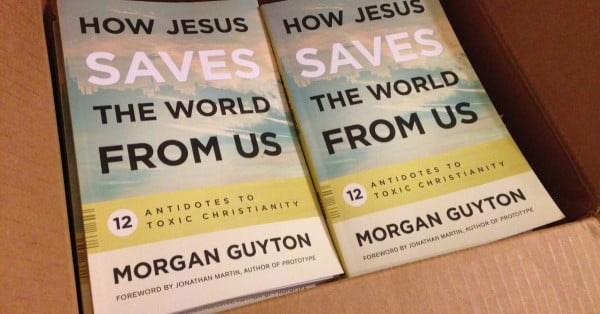Every parent messes up their kids. It’s inevitable. But when you throw toxic Christian theology into the mix, the results can be spiritually damaging. So many good Christians are harming their children because they’re genuinely trying to be faithful to the religion they’ve been taught. My book How Jesus Saves The World From Us: 12 Antidotes To Toxic Christianity provides twelve ways to avoid passing on a faith that hurts more than it heals.
1. Worship Not Performance. In my first chapter, I define worship as authentic delight in the beauty of God. Too many times, we make worship into a performance, whether it’s for God or other people. Children know how to worship. Until they lose their innocence, their world is a place of continuous wonder and delight. That’s why Jesus says we must receive the kingdom of heaven like a child or we will never enter it. If we really take Jesus at his word, then we should let our children teach us how to worship. Our parenting should be done with a second naivete so that we can genuinely delight in our children’s discoveries.
2. Mercy Not Sacrifice. Jesus tells the Pharisees to find out what it means that God desires mercy not sacrifice. To me, this makes it clear that God is not a banker whose primary concern is making sure that no debt of sin remains unpaid. Jesus’ sacrifice on the cross sets us free from a life of transactional morality so that we can treat other with the unconditional mercy we’ve received. The most sacred moments in parenting are when I have the opportunity to show mercy. Some would criticize me for inconsistency when I don’t follow through with punishing my sons for their misbehavior. I don’t see much value in punishment for retribution’s sake. Whatever consequences I give are always for the sake of teaching. And teaching mercy is the most important lesson for my sons.
3. Empty Not Clean
In the culture war context of my upbringing, the one critically important duty of Christian parents was to protect their children from worldly influences. There was an assumption that if you could keep your kids away from rock and roll, R-rated movies, sex ed, and evolution, then you could protect their morality. But the moral citadel approach to Christian parenting has often been a disaster. Better than keeping our kids clean is to show them how to empty their hearts of idols through prayer and meditation. We should help them cultivate a positive desire for God rather than trying to firewall them from every possible sinful desire.
4. Breath Not Meat
The apostle Paul talks about two very different ways of living: in the flesh and in the spirit. The Greek words that get translated “spirit” and “flesh” could just as easily be translated “breath” and “meat.” To live as meat is to have a sluggish, anxious existence of mindless consumption. To live as breath is to have a fully awake existence of mindful enjoyment. It’s important to teach our kids to love their bodies without shame, understanding that whatever limits we put on our behavior are for the sake of achieving a higher level of physical vitality.
5. Honor Not Terror
One of the most damaging things we can teach our children is that they’re supposed to be scared of God. This often happens in the context of teaching them about heaven and hell. I teach my sons that hell is the loneliness of always running away from God. Heaven happens when we are sensitive enough to hear God’s still, small voice of love. The Bible talks a lot about the “fear of the Lord” as a positive concept. It doesn’t mean that it’s good to be afraid of God like Adam and Eve were when they hid in the bushes. The fear of the Lord means to live with the delicacy required to avoid any violation of the truth. It is about honor not terror.
6. Poetry Not Math
The Bible has acquired such a toxic stigma because of the way that it has been weaponized in Christian culture. A healthy view of the Bible appropriates it as poetry to be embodied rather than math problems to be solved. We should not present it to our children as a life manual that has an answer for every question they have. It is rather a giant poem whose words should be performed and prayed. So we should absolutely encourage our children to memorize scripture, especially the psalms, so that they have the words to talk back to their lives whenever they need to.

Image: provided by Morgan Guyton, the author
7. Communion Not Correctness
Christian doctrine is shaped by the need to create a cohesive spiritual community. It is not a set of ahistorical correct answers but the testimony of lived journeys of centuries of Christians. The point of doctrine is to allow the heart to connect as deeply with God as possible. We will not be able to explain to our children complex mysteries like the Trinity or the atonement. But we can practice rituals with them that they perform before they learn the full meaning of the words that they’re saying.
8. Temple Not Program
It is so important to expose our children to a sense of the sacred. If their Christian teaching is all head-knowledge, then they will exchange it for secular humanism when they go to college. If youth group is all silly games, they’ll soon learn that you can play silly games that have nothing to do with Jesus. They need to spend time in temples. I see a lot of value in creating sacred space within our homes using candles and icons where we can sit to pray as a family.
9. Solidarity Not Sanctimony
These two words may be inaccessible vocabulary for my sons, but they describe two very different attitudes about sin that shape how I discipline them. Sanctimony places the most value on ensuring that every rule is kept. Solidarity values the well-being of every person above all. Whenever I discipline my sons, the goal is to help them grow not to defend the sanctity of my rules.
10. Outsiders Not Insiders
The Greek word for church is ekklesia, which means literally those who have been “called out.” Christians are supposed to be a group of people who have renounced our worldly privilege in order to be perfectly hospitable to the world’s outsiders. But too often, Christianity’s purpose is to validate the superiority of the world’s insiders. It’s very important to model empathy for our children, especially in our encounters with marginalized outsiders. Whenever we involve our kids in service opportunities, we must be very intentional about treating any recipients of our service with the utmost dignity and not reinforcing a provider/client power dynamic in our conversational posture.
11. Servanthood Not Leadership
Jesus tells us that Christian leadership is servanthood. It’s not about controlling others; it’s about empowering others. This applies to parenthood as well. Even though I have to set boundaries for my sons, I try to take their perspectives absolutely seriously and modify what I’m doing according to their suggestions. I don’t see much value in overpowering them physically or verbally solely for the sake of establishing my authority. My goal is for them to become thoughtful decision-makers and negotiators.
12. Kingdom Not Stadium
I will never tell my kids that their classmates who aren’t Christian are going to hell. I don’t know what God’s going to do with people who aren’t Christian, but I do know he is merciful. I also know that God has done amazing things in my life as a Christian. I don’t believe that the goal of Christian evangelism is to pack a stadium full of people who all share the same beliefs. Christian evangelism is a pilgrimage into God’s kingdom. I share testimony about my journey with my fellow pilgrims and expect God to teach me through their testimony, whether they’re fellow Christians or not. The goal isn’t to make other people submit to my beliefs; the goal is to discover the voice of the Holy Spirit together.
Morgan Guyton has just released his first book How Jesus Saves the World from Us: 12 Antidotes to Toxic Christianity with Westminster John Knox. His blog “Mercy Not Sacrifice” is hosted at Patheos. He and his wife Cheryl are co-directors of the NOLA Wesley United Methodist Campus Center at Tulane and Loyola in New Orleans, LA.
Get a free download of a Christian parenting manifesto that helps us guide children into healthy spirituality + the most helpful parenting resources with progressive values.












